According to data obtained from the Nigerian Electricity Regulatory Commission, 37 companies have been granted new licenses and permits to generate a total of 762.3 megawatts of electricity to increase the power supply across the country.
According to the commission’s latest Fourth Quarter 2021 Report, which was released on Sunday, the metering of power users decreased by 71.86 percent when compared to the number of those metered by power distribution companies in the previous quarter.
The commission approved the issuance of four new generation licenses with a total nameplate capacity of 508.5MW and the renewal of two existing licences in 2021/Q4, according to the new report.
The commission also approved 25 mini-grid permits and granted an aggregate capacity of 253.75MW captive power generation permit to eight companies.
The commission also approved 46 metering service providers in 2021/Q4 of which 17 installers, 15 manufacturers, two vendors, and 12 importers were listed.
In 2021/Q4, the commission granted a total of 85 licenses and permits, according to the report.
It stated that the massive metering gap for end-use customers was still a major challenge in the industry.
According to the NERC, “a total of 81,084 meters were installed in 2021/Q4, compared to 288,154 meters installed in 2021/Q3.”
“The reduction in the number of meter installations in 2021/Q4 was largely driven by the winding down of the NMMP (National Mass Metering Programme) phase zero,” it explained.
“According to the commission’s records, only 4,773,217 (45.40 percent) of the 10,514,582 registered energy customers as of December 2021 have been metered, compared to 42.93 percent metering as of September 2021.”
It did, however, state that the commission had set maximum limits to the amount of energy (energy caps in kWh) that could be billed to unmetered customers as a safeguard against overbilling.
The NERC stated;
The cap for each customer is set based on the customer category, consumption of metered customers on the same feeder, and the customer’s tariff band.”
“The caps are computed based on three-month data of actual consumption records of metered customers on the same feeder, the company added.
Concerning customer complaints, the regulator stated that Discos received 222,639 complaints from consumers in 2021/Q4, which was 24,479 (-9.91%) fewer complaints than in 2021/Q3.
In total, the Discos resolved 212,382 complaints, for a 95.39% resolution rate.” Metering, billing, and service interruption were the most common sources of customer complaints, accounting for 58.83 percent of total complaints during the quarter, the report said.











